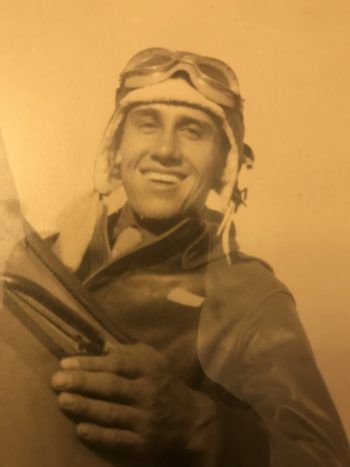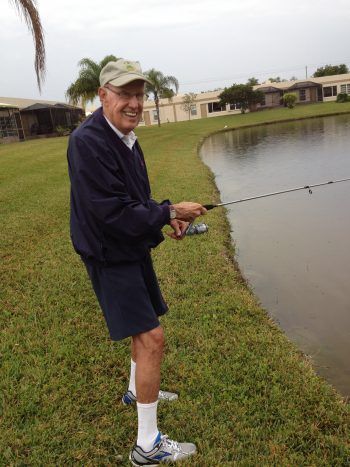Willis Donald Henry, 1924–2021
 The formidable Willis Donald Henry, known as Don to some, Hank to others, and Hop Pop to his grandchildren, died October 13 in Roaring Gap, North Carolina, from complications of dementia. He was 97.
The formidable Willis Donald Henry, known as Don to some, Hank to others, and Hop Pop to his grandchildren, died October 13 in Roaring Gap, North Carolina, from complications of dementia. He was 97.
Hank was a man of deep intelligence, integrity, and humility. He was a respected veteran, educator, and an athlete with a strong pull to competition on and off the field. He hit a hole-in-one on the golf course at age 87, was winning money at the poker table until the end of his life. He had fierce loyalty to his loved ones, a tender streak, and a subtle, sometimes sneaky sense of humor (see snipe hunting).
For better or for worse, tributes such as this one are likely to call upon labels such as Greatest Generation and aphorisms like “did not suffer fools gladly,” the latter as a thinly veiled way to excuse insensitivity. Hank, as much as he was a man of his generation, would not have appreciated cliches or all of this talking about him. He didn’t wear WWII hats or have bumper stickers on his car. He liked to win, but he didn’t celebrate. He did the right thing in the moment, and then he moved on.
Born and raised in eastern Pennsylvania Amish country in a house with an outhouse, Hank grew up hunting and fishing and playing baseball. His father owned a small flour mill, and his mom was a teacher. Hank’s grandfather on his father’s side was a soldier in the Civil War.
As a child, Hank trapped mink and sold the skins for one dollar a piece. He was out there with his trapline in the dark before he walked to school, and if he happened to catch a skunk, he had to change his clothes and perhaps be late for school.
Hank’s dad, with whom he was close, died of tuberculosis, and this is a story he told the most in his life. It was his biggest hurt. He would tell people his dad died when he was “only” fifteen. This, says his wife Joan, was the source of his tenderness.
During his freshman year at Lehigh University, Hank enlisted in the Army along with most of his fraternity. He was a lieutenant pilot. A story he told—but not often—was that once he was flying and the engine shut off. Everyone was ready to jump out. He would stay with the plane. He remained calm in the chaos. He got the engine started. Another time, two spies had to be forced off the plane he was flying.
After two and a half years, Hank returned home, graduated from college, and hoped to enter the minor leagues. His time in the Army had hurt that chance. He decided to combine his leadership skills and passion for learning and sports with a career in education.
In grad school, Hank met Joan May Cox, the woman who would change his life. The story goes that he was in the back of the room reading basketball magazines, and Joan was in the front row answering all of the teacher’s questions. Hank was handsome, six feet and athletically built with dark wavy hair and chiseled features. Though that didn’t catch Joan’s attention, it did when she heard he was making a fuss that women teachers weren’t getting paid as much as he was. “I thought that was bold,” Joan said.
After their last class, he offered her a ride home in his car. There were many parks she wanted to visit, and Hank offered to take her. He asked her, unromantically, “How’d you get to be a nerd?”
After several months of visiting all of the parks within driving distance of Trenton, Hank took Joan to his family’s property, and they went for a walk with a .22. “He didn’t know that I’d grown up shooting rats in the barn,” Joan said. “I was an excellent shot.” Hank pointed to a branch of an oak tree and said, “I’m looking for a girl. If you can knock those acorns off that tree, I’ll marry you.”
Joan shot down the branch and with it came the acorns. Hank asked her to marry him on the spot.
They were married for seventy years.
“He was a perfect match for me, and I didn’t even know it,” Joan says. Some say marrying Joan was the best thing Hank ever did and that it spoke to his humanity and his intelligence that he would marry someone who was as sharp as he was.
Joan, who went on to become the director of the special education program for Bristol Township, was very social. “My mom would walk in a room of 100 people and literally know everyone in ten minutes,” said their son, Tom. “Meanwhile my dad had a list of people’s names in his pocket.”
The couple suffered several miscarriages, which shook Joan especially, though they didn’t talk about them publicly. Hank, true to form, said they needed to move on. Tom was born in 1955.
Their careers flourished. Hank went from principal and coach to the director of secondary education. Colleagues describe him as clear and outspoken and supportive of the staff, weathering two teacher strikes during his time as principal at Pennsbury High. In 1968, the state department asked Hank to help lead a team of distinguished educators for an educational exchange in Russia, East Germany, and Czechoslovakia.
Bill Donaldson, who worked under Hank for twenty years, describes a strong man who held others accountable, who didn’t go by books and theory and education-ese. “It came down to what’s good for kids,” he said. “I think that’s what motivated him in his job.”
Donaldson’s stories paint a picture of a well-respected principal and administrator who was assertive, prepared, and liked to be in control. “When he was principal, he’d have a cigar after the buses left. When I took over, I’d always have a couple cigars on hand for faculty having babies. I would light one up occasionally, and it would grow very quiet. They thought Don Henry was in the building.”
Everyone who knows the Henry family knows about the family cabin on Promised Land Lake in the Poconos. It was here that the family recharged, where they entertained, where a young friend of Tom’s stayed up all night to watch for snipe at Hank’s urging.
Don had a special relationship with his sister, Charlotte. They were best friends. They would just disappear out in the Poconos. They’d go out at dawn and be out for hours, walking, hunting, and fishing.
Warren Knop, a lifelong friend of Tom’s who was especially fond of Hank, recalls the mischief he and Tom and their friends would make at the lake. On one occasion, they “borrowed” Hank’s canoe and packed it with a case of beer, taking turns jumping out of the canoe. “The park rangers were unhappy with us, and you see Hank on the shoreline yelling out ‘I don’t know who those guys are.’”
“We put the old guy through so much torment,” Knop said. “Up through the end of high school…I never saw Hank with a bigger smile than when Tom went to college.”
 Hank retired from work in 1982 and spent the forty years of his retirement golfing, fishing, hunting, reading Westerns, watching Westerns, and spending time with his grandchildren. He enjoyed birdwatching and going for daily walks with Joan.
Hank retired from work in 1982 and spent the forty years of his retirement golfing, fishing, hunting, reading Westerns, watching Westerns, and spending time with his grandchildren. He enjoyed birdwatching and going for daily walks with Joan.
He and Joan were the ideal grandparents to Tom’s four children, Ashley, Trevor, Thomas, and McCord, visiting North Carolina when they could from their winter home in Florida or summer home in Pennsylvania—always for two nights and three days—and taking each a child alone for a weekend visit once a year. Each visit, Hop Pop would play sports with the boys and take Ashley, his only granddaughter, out for breakfast.
When Hop Pop and “Mimi” took the grandchildren shopping, their typically frugal ways went out the window. More than once, Hank’s credit card was stopped because of Mimi’s unusual spending at Abercrombie and Fitch or some other mall store.
When Tom was inducted as head minister of a church in North Carolina, it reignited Hank’s interest in religion, having been an Easter and Christmas church go-er for much of his life. “I think for him finding God was really understanding the grace part,” said Tom. “Understanding that even when you fail, there’s a celebration. Even when you don’t work hard.”
Hank read a devotion every day and participated in a church group, but he often got impatient with church. He wanted to be watching the game.
Many in the Henry circle credit Joan with balancing out Hank’s lesser qualities. She would tell him when she thought he might have hurt someone’s feelings, when his needling got to be too much. “Sometimes I didn’t think he’d heard a word I’d said,” she said. “He let me think he didn’t hear me. Then he might bring it up a month later, and I’d say ‘Hank, I didn’t think you were listening.’”
Their nephew Bob Keehn remembers Hank and Joan would take a “nap” every afternoon at Promised Land Lake. At the time, as a child, he just couldn’t understand why they had to nap so much. “They had a love for each other that would make most of us envious,” he said.
“We created a rich environment,” said Joan. “It wasn’t perfect. For most people, it was as good as it gets.”
Did we mention Hank liked to dance? A video captures him at 96 in khaki pants and a button-up shirt, unfurling an American flag on his back deck, then dancing, laughing, saluting the flag, all to an eighties song called “If You Leave.” He radiates joy. That he needled family members about their weight, leading grandson Thomas to joke at his Celebration of Life that he was like a Jenny Craig Weight Watchers consultant? That he chased the squirrels away from his bird feeders ten times a day or more, irritatedly forgoing his walker when he needed one at the end of his life?
Tom says one part of his father’s legacy is that he wanted to leave the world a better place by building leaders. Anyone he was with, whether students or colleagues or loved ones, they wanted to be better.
“You wanted to get back at him by winning,” Tom said of his father’s competitive streak. “But he would never let me win.”
On Memorial Day of 2014, Hank gifted Thomas an oil painting featuring two B-24 bombers over the mountains in Germany. He inscribed on the back: “Those of us that fought what we thought was the war to end all wars are soon leaving a world still in chaos… This painting shows blue skies, but as I guided that plane over missions in Germany, my crew knew that it might be our last. God spared me. Perhaps so that I could leave a part of my legacy to you, Thomas. Today I honor all those who never survived and honor what ‘family’ really means. God has blessed me beyond measure.”
Willis Donald Henry will be buried at Arlington National Cemetery in a private ceremony.